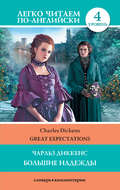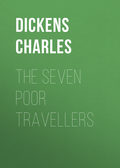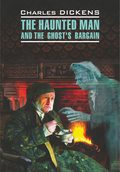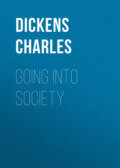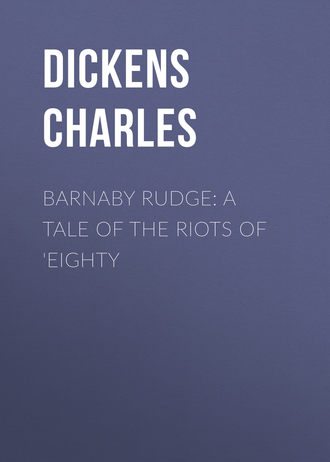
Чарльз Диккенс
Barnaby Rudge: A Tale of the Riots of 'Eighty
Joe expressed his obligations, and continued, ‘You can trust me then, and credit what I say. I believe I shall enlist in your regiment to-night. The reason I don’t do so now is, because I don’t want until to-night, to do what I can’t recall. Where shall I find you, this evening?’
His friend replied with some unwillingness, and after much ineffectual entreaty having for its object the immediate settlement of the business, that his quarters would be at the Crooked Billet in Tower Street; where he would be found waking until midnight, and sleeping until breakfast time to-morrow.
‘And if I do come – which it’s a million to one, I shall – when will you take me out of London?’ demanded Joe.
‘To-morrow morning, at half after eight o’clock,’ replied the serjeant. ‘You’ll go abroad – a country where it’s all sunshine and plunder – the finest climate in the world.’
‘To go abroad,’ said Joe, shaking hands with him, ‘is the very thing I want. You may expect me.’
‘You’re the kind of lad for us,’ cried the serjeant, holding Joe’s hand in his, in the excess of his admiration. ‘You’re the boy to push your fortune. I don’t say it because I bear you any envy, or would take away from the credit of the rise you’ll make, but if I had been bred and taught like you, I’d have been a colonel by this time.’
‘Tush, man!’ said Joe, ‘I’m not so young as that. Needs must when the devil drives; and the devil that drives me is an empty pocket and an unhappy home. For the present, good-bye.’
‘For king and country!’ cried the serjeant, flourishing his cap.
‘For bread and meat!’ cried Joe, snapping his fingers. And so they parted.
He had very little money in his pocket; so little indeed, that after paying for his breakfast (which he was too honest and perhaps too proud to score up to his father’s charge) he had but a penny left. He had courage, notwithstanding, to resist all the affectionate importunities of the serjeant, who waylaid him at the door with many protestations of eternal friendship, and did in particular request that he would do him the favour to accept of only one shilling as a temporary accommodation. Rejecting his offers both of cash and credit, Joe walked away with stick and bundle as before, bent upon getting through the day as he best could, and going down to the locksmith’s in the dusk of the evening; for it should go hard, he had resolved, but he would have a parting word with charming Dolly Varden.
He went out by Islington and so on to Highgate, and sat on many stones and gates, but there were no voices in the bells to bid him turn. Since the time of noble Whittington, fair flower of merchants, bells have come to have less sympathy with humankind. They only ring for money and on state occasions. Wanderers have increased in number; ships leave the Thames for distant regions, carrying from stem to stern no other cargo; the bells are silent; they ring out no entreaties or regrets; they are used to it and have grown worldly.
Joe bought a roll, and reduced his purse to the condition (with a difference) of that celebrated purse of Fortunatus, which, whatever were its favoured owner’s necessities, had one unvarying amount in it. In these real times, when all the Fairies are dead and buried, there are still a great many purses which possess that quality. The sum-total they contain is expressed in arithmetic by a circle, and whether it be added to or multiplied by its own amount, the result of the problem is more easily stated than any known in figures.
Evening drew on at last. With the desolate and solitary feeling of one who had no home or shelter, and was alone utterly in the world for the first time, he bent his steps towards the locksmith’s house. He had delayed till now, knowing that Mrs Varden sometimes went out alone, or with Miggs for her sole attendant, to lectures in the evening; and devoutly hoping that this might be one of her nights of moral culture.
He had walked up and down before the house, on the opposite side of the way, two or three times, when as he returned to it again, he caught a glimpse of a fluttering skirt at the door. It was Dolly’s – to whom else could it belong? no dress but hers had such a flow as that. He plucked up his spirits, and followed it into the workshop of the Golden Key.
His darkening the door caused her to look round. Oh that face! ‘If it hadn’t been for that,’ thought Joe, ‘I should never have walked into poor Tom Cobb. She’s twenty times handsomer than ever. She might marry a Lord!’
He didn’t say this. He only thought it – perhaps looked it also. Dolly was glad to see him, and was SO sorry her father and mother were away from home. Joe begged she wouldn’t mention it on any account.
Dolly hesitated to lead the way into the parlour, for there it was nearly dark; at the same time she hesitated to stand talking in the workshop, which was yet light and open to the street. They had got by some means, too, before the little forge; and Joe having her hand in his (which he had no right to have, for Dolly only gave it him to shake), it was so like standing before some homely altar being married, that it was the most embarrassing state of things in the world.
‘I have come,’ said Joe, ‘to say good-bye – to say good-bye for I don’t know how many years; perhaps for ever. I am going abroad.’
Now this was exactly what he should not have said. Here he was, talking like a gentleman at large who was free to come and go and roam about the world at pleasure, when that gallant coachmaker had vowed but the night before that Miss Varden held him bound in adamantine chains; and had positively stated in so many words that she was killing him by inches, and that in a fortnight more or thereabouts he expected to make a decent end and leave the business to his mother.
Dolly released her hand and said ‘Indeed!’ She remarked in the same breath that it was a fine night, and in short, betrayed no more emotion than the forge itself.
‘I couldn’t go,’ said Joe, ‘without coming to see you. I hadn’t the heart to.’
Dolly was more sorry than she could tell, that he should have taken so much trouble. It was such a long way, and he must have such a deal to do. And how WAS Mr Willet – that dear old gentleman —
‘Is this all you say!’ cried Joe.
All! Good gracious, what did the man expect! She was obliged to take her apron in her hand and run her eyes along the hem from corner to corner, to keep herself from laughing in his face; – not because his gaze confused her – not at all.
Joe had small experience in love affairs, and had no notion how different young ladies are at different times; he had expected to take Dolly up again at the very point where he had left her after that delicious evening ride, and was no more prepared for such an alteration than to see the sun and moon change places. He had buoyed himself up all day with an indistinct idea that she would certainly say ‘Don’t go,’ or ‘Don’t leave us,’ or ‘Why do you go?’ or ‘Why do you leave us?’ or would give him some little encouragement of that sort; he had even entertained the possibility of her bursting into tears, of her throwing herself into his arms, of her falling down in a fainting fit without previous word or sign; but any approach to such a line of conduct as this, had been so far from his thoughts that he could only look at her in silent wonder.
Dolly in the meanwhile, turned to the corners of her apron, and measured the sides, and smoothed out the wrinkles, and was as silent as he. At last after a long pause, Joe said good-bye. ‘Good-bye’ – said Dolly – with as pleasant a smile as if he were going into the next street, and were coming back to supper; ‘good-bye.’
‘Come,’ said Joe, putting out both hands, ‘Dolly, dear Dolly, don’t let us part like this. I love you dearly, with all my heart and soul; with as much truth and earnestness as ever man loved woman in this world, I do believe. I am a poor fellow, as you know – poorer now than ever, for I have fled from home, not being able to bear it any longer, and must fight my own way without help. You are beautiful, admired, are loved by everybody, are well off and happy; and may you ever be so! Heaven forbid I should ever make you otherwise; but give me a word of comfort. Say something kind to me. I have no right to expect it of you, I know, but I ask it because I love you, and shall treasure the slightest word from you all through my life. Dolly, dearest, have you nothing to say to me?’
No. Nothing. Dolly was a coquette by nature, and a spoilt child. She had no notion of being carried by storm in this way. The coachmaker would have been dissolved in tears, and would have knelt down, and called himself names, and clasped his hands, and beat his breast, and tugged wildly at his cravat, and done all kinds of poetry. Joe had no business to be going abroad. He had no right to be able to do it. If he was in adamantine chains, he couldn’t.
‘I have said good-bye,’ said Dolly, ‘twice. Take your arm away directly, Mr Joseph, or I’ll call Miggs.’
‘I’ll not reproach you,’ answered Joe, ‘it’s my fault, no doubt. I have thought sometimes that you didn’t quite despise me, but I was a fool to think so. Every one must, who has seen the life I have led – you most of all. God bless you!’
He was gone, actually gone. Dolly waited a little while, thinking he would return, peeped out at the door, looked up the street and down as well as the increasing darkness would allow, came in again, waited a little longer, went upstairs humming a tune, bolted herself in, laid her head down on her bed, and cried as if her heart would break. And yet such natures are made up of so many contradictions, that if Joe Willet had come back that night, next day, next week, next month, the odds are a hundred to one she would have treated him in the very same manner, and have wept for it afterwards with the very same distress.
She had no sooner left the workshop than there cautiously peered out from behind the chimney of the forge, a face which had already emerged from the same concealment twice or thrice, unseen, and which, after satisfying itself that it was now alone, was followed by a leg, a shoulder, and so on by degrees, until the form of Mr Tappertit stood confessed, with a brown-paper cap stuck negligently on one side of its head, and its arms very much a-kimbo.
‘Have my ears deceived me,’ said the ‘prentice, ‘or do I dream! am I to thank thee, Fortun’, or to cus thee – which?’
He gravely descended from his elevation, took down his piece of looking-glass, planted it against the wall upon the usual bench, twisted his head round, and looked closely at his legs.
‘If they’re a dream,’ said Sim, ‘let sculptures have such wisions, and chisel ‘em out when they wake. This is reality. Sleep has no such limbs as them. Tremble, Willet, and despair. She’s mine! She’s mine!’
With these triumphant expressions, he seized a hammer and dealt a heavy blow at a vice, which in his mind’s eye represented the sconce or head of Joseph Willet. That done, he burst into a peal of laughter which startled Miss Miggs even in her distant kitchen, and dipping his head into a bowl of water, had recourse to a jack-towel inside the closet door, which served the double purpose of smothering his feelings and drying his face.
Joe, disconsolate and down-hearted, but full of courage too, on leaving the locksmith’s house made the best of his way to the Crooked Billet, and there inquired for his friend the serjeant, who, expecting no man less, received him with open arms. In the course of five minutes after his arrival at that house of entertainment, he was enrolled among the gallant defenders of his native land; and within half an hour, was regaled with a steaming supper of boiled tripe and onions, prepared, as his friend assured him more than once, at the express command of his most Sacred Majesty the King. To this meal, which tasted very savoury after his long fasting, he did ample justice; and when he had followed it up, or down, with a variety of loyal and patriotic toasts, he was conducted to a straw mattress in a loft over the stable, and locked in there for the night.
The next morning, he found that the obliging care of his martial friend had decorated his hat with sundry particoloured streamers, which made a very lively appearance; and in company with that officer, and three other military gentlemen newly enrolled, who were under a cloud so dense that it only left three shoes, a boot, and a coat and a half visible among them, repaired to the riverside. Here they were joined by a corporal and four more heroes, of whom two were drunk and daring, and two sober and penitent, but each of whom, like Joe, had his dusty stick and bundle. The party embarked in a passage-boat bound for Gravesend, whence they were to proceed on foot to Chatham; the wind was in their favour, and they soon left London behind them, a mere dark mist – a giant phantom in the air.
Chapter 32
Misfortunes, saith the adage, never come singly. There is little doubt that troubles are exceedingly gregarious in their nature, and flying in flocks, are apt to perch capriciously; crowding on the heads of some poor wights until there is not an inch of room left on their unlucky crowns, and taking no more notice of others who offer as good resting-places for the soles of their feet, than if they had no existence. It may have happened that a flight of troubles brooding over London, and looking out for Joseph Willet, whom they couldn’t find, darted down haphazard on the first young man that caught their fancy, and settled on him instead. However this may be, certain it is that on the very day of Joe’s departure they swarmed about the ears of Edward Chester, and did so buzz and flap their wings, and persecute him, that he was most profoundly wretched.
It was evening, and just eight o’clock, when he and his father, having wine and dessert set before them, were left to themselves for the first time that day. They had dined together, but a third person had been present during the meal, and until they met at table they had not seen each other since the previous night.
Edward was reserved and silent. Mr Chester was more than usually gay; but not caring, as it seemed, to open a conversation with one whose humour was so different, he vented the lightness of his spirit in smiles and sparkling looks, and made no effort to awaken his attention. So they remained for some time: the father lying on a sofa with his accustomed air of graceful negligence; the son seated opposite to him with downcast eyes, busied, it was plain, with painful and uneasy thoughts.
‘My dear Edward,’ said Mr Chester at length, with a most engaging laugh, ‘do not extend your drowsy influence to the decanter. Suffer THAT to circulate, let your spirits be never so stagnant.’
Edward begged his pardon, passed it, and relapsed into his former state.
‘You do wrong not to fill your glass,’ said Mr Chester, holding up his own before the light. ‘Wine in moderation – not in excess, for that makes men ugly – has a thousand pleasant influences. It brightens the eye, improves the voice, imparts a new vivacity to one’s thoughts and conversation: you should try it, Ned.’
‘Ah father!’ cried his son, ‘if – ’
‘My good fellow,’ interposed the parent hastily, as he set down his glass, and raised his eyebrows with a startled and horrified expression, ‘for Heaven’s sake don’t call me by that obsolete and ancient name. Have some regard for delicacy. Am I grey, or wrinkled, do I go on crutches, have I lost my teeth, that you adopt such a mode of address? Good God, how very coarse!’
‘I was about to speak to you from my heart, sir,’ returned Edward, ‘in the confidence which should subsist between us; and you check me in the outset.’
‘Now DO, Ned, DO not,’ said Mr Chester, raising his delicate hand imploringly, ‘talk in that monstrous manner. About to speak from your heart. Don’t you know that the heart is an ingenious part of our formation – the centre of the blood-vessels and all that sort of thing – which has no more to do with what you say or think, than your knees have? How can you be so very vulgar and absurd? These anatomical allusions should be left to gentlemen of the medical profession. They are really not agreeable in society. You quite surprise me, Ned.’
‘Well! there are no such things to wound, or heal, or have regard for. I know your creed, sir, and will say no more,’ returned his son.
‘There again,’ said Mr Chester, sipping his wine, ‘you are wrong. I distinctly say there are such things. We know there are. The hearts of animals – of bullocks, sheep, and so forth – are cooked and devoured, as I am told, by the lower classes, with a vast deal of relish. Men are sometimes stabbed to the heart, shot to the heart; but as to speaking from the heart, or to the heart, or being warm-hearted, or cold-hearted, or broken-hearted, or being all heart, or having no heart – pah! these things are nonsense, Ned.’
‘No doubt, sir,’ returned his son, seeing that he paused for him to speak. ‘No doubt.’
‘There’s Haredale’s niece, your late flame,’ said Mr Chester, as a careless illustration of his meaning. ‘No doubt in your mind she was all heart once. Now she has none at all. Yet she is the same person, Ned, exactly.’
‘She is a changed person, sir,’ cried Edward, reddening; ‘and changed by vile means, I believe.’
‘You have had a cool dismissal, have you?’ said his father. ‘Poor Ned! I told you last night what would happen. – May I ask you for the nutcrackers?’
‘She has been tampered with, and most treacherously deceived,’ cried Edward, rising from his seat. ‘I never will believe that the knowledge of my real position, given her by myself, has worked this change. I know she is beset and tortured. But though our contract is at an end, and broken past all redemption; though I charge upon her want of firmness and want of truth, both to herself and me; I do not now, and never will believe, that any sordid motive, or her own unbiassed will, has led her to this course – never!’
‘You make me blush,’ returned his father gaily, ‘for the folly of your nature, in which – but we never know ourselves – I devoutly hope there is no reflection of my own. With regard to the young lady herself, she has done what is very natural and proper, my dear fellow; what you yourself proposed, as I learn from Haredale; and what I predicted – with no great exercise of sagacity – she would do. She supposed you to be rich, or at least quite rich enough; and found you poor. Marriage is a civil contract; people marry to better their worldly condition and improve appearances; it is an affair of house and furniture, of liveries, servants, equipage, and so forth. The lady being poor and you poor also, there is an end of the matter. You cannot enter upon these considerations, and have no manner of business with the ceremony. I drink her health in this glass, and respect and honour her for her extreme good sense. It is a lesson to you. Fill yours, Ned.’
‘It is a lesson,’ returned his son, ‘by which I hope I may never profit, and if years and experience impress it on – ’
‘Don’t say on the heart,’ interposed his father.
‘On men whom the world and its hypocrisy have spoiled,’ said Edward warmly, ‘Heaven keep me from its knowledge.’
‘Come, sir,’ returned his father, raising himself a little on the sofa, and looking straight towards him; ‘we have had enough of this. Remember, if you please, your interest, your duty, your moral obligations, your filial affections, and all that sort of thing, which it is so very delightful and charming to reflect upon; or you will repent it.’
‘I shall never repent the preservation of my self-respect, sir,’ said Edward. ‘Forgive me if I say that I will not sacrifice it at your bidding, and that I will not pursue the track which you would have me take, and to which the secret share you have had in this late separation tends.’
His father rose a little higher still, and looking at him as though curious to know if he were quite resolved and earnest, dropped gently down again, and said in the calmest voice – eating his nuts meanwhile,
‘Edward, my father had a son, who being a fool like you, and, like you, entertaining low and disobedient sentiments, he disinherited and cursed one morning after breakfast. The circumstance occurs to me with a singular clearness of recollection this evening. I remember eating muffins at the time, with marmalade. He led a miserable life (the son, I mean) and died early; it was a happy release on all accounts; he degraded the family very much. It is a sad circumstance, Edward, when a father finds it necessary to resort to such strong measures.
‘It is,’ replied Edward, ‘and it is sad when a son, proffering him his love and duty in their best and truest sense, finds himself repelled at every turn, and forced to disobey. Dear father,’ he added, more earnestly though in a gentler tone, ‘I have reflected many times on what occurred between us when we first discussed this subject. Let there be a confidence between us; not in terms, but truth. Hear what I have to say.’
‘As I anticipate what it is, and cannot fail to do so, Edward,’ returned his father coldly, ‘I decline. I couldn’t possibly. I am sure it would put me out of temper, which is a state of mind I can’t endure. If you intend to mar my plans for your establishment in life, and the preservation of that gentility and becoming pride, which our family have so long sustained – if, in short, you are resolved to take your own course, you must take it, and my curse with it. I am very sorry, but there’s really no alternative.’
‘The curse may pass your lips,’ said Edward, ‘but it will be but empty breath. I do not believe that any man on earth has greater power to call one down upon his fellow – least of all, upon his own child – than he has to make one drop of rain or flake of snow fall from the clouds above us at his impious bidding. Beware, sir, what you do.’
‘You are so very irreligious, so exceedingly undutiful, so horribly profane,’ rejoined his father, turning his face lazily towards him, and cracking another nut, ‘that I positively must interrupt you here. It is quite impossible we can continue to go on, upon such terms as these. If you will do me the favour to ring the bell, the servant will show you to the door. Return to this roof no more, I beg you. Go, sir, since you have no moral sense remaining; and go to the Devil, at my express desire. Good day.’
Edward left the room without another word or look, and turned his back upon the house for ever.
The father’s face was slightly flushed and heated, but his manner was quite unchanged, as he rang the bell again, and addressed the servant on his entrance.
‘Peak – if that gentleman who has just gone out – ’
‘I beg your pardon, sir, Mr Edward?’
‘Were there more than one, dolt, that you ask the question? – If that gentleman should send here for his wardrobe, let him have it, do you hear? If he should call himself at any time, I’m not at home. You’ll tell him so, and shut the door.’
So, it soon got whispered about, that Mr Chester was very unfortunate in his son, who had occasioned him great grief and sorrow. And the good people who heard this and told it again, marvelled the more at his equanimity and even temper, and said what an amiable nature that man must have, who, having undergone so much, could be so placid and so calm. And when Edward’s name was spoken, Society shook its head, and laid its finger on its lip, and sighed, and looked very grave; and those who had sons about his age, waxed wrathful and indignant, and hoped, for Virtue’s sake, that he was dead. And the world went on turning round, as usual, for five years, concerning which this Narrative is silent.




